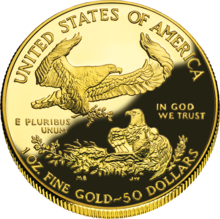American Gold Eagle: Difference between revisions
Bobby131313 (talk | contribs) Undid revision 388184482 by 72.37.181.158 (talk) |
|||
| Line 140: | Line 140: | ||
*[http://www.silvergoldtrade.com/userfiles/image/2006_AE_Gold_Bullion_Hi-Res_Obv.jpg High resolution image Obverse] |
*[http://www.silvergoldtrade.com/userfiles/image/2006_AE_Gold_Bullion_Hi-Res_Obv.jpg High resolution image Obverse] |
||
*[http://www.silvergoldtrade.com/userfiles/image/2006_AE_Gold_Bullion_Hi-Res_Rev.jpg High resolution image Reverse] |
*[http://www.silvergoldtrade.com/userfiles/image/2006_AE_Gold_Bullion_Hi-Res_Rev.jpg High resolution image Reverse] |
||
*[http://www.regalgoldcoins.com/gold-eagle-proof.html Eagle Proof Gold Coins] |
|||
{{US currency and coinage}} |
{{US currency and coinage}} |
||
Revision as of 20:40, 20 October 2010
| Gold Eagle (United States) | |
|---|---|
| Edge | Reeded |
| Composition | 91.67% Au 3% Ag 5.33% Cu |
| Years of minting | 1986–present Bullion 1986–2008 Proof |
| Obverse | |

| |
| Design: | Liberty |
| Designer: | Augustus Saint-Gaudens |
| Reverse | |

| |
| Design | Eagle soaring above his nest. |
| Designer | Miley Busiek |
| Design date | 1986 |
The American Gold Eagle is an official gold bullion coin of the United States. Authorized under the Gold Bullion Coin Act of 1985, it was first released by the United States Mint in 1986.
Details
Offered in 1/10 oz, 1/4 oz, 1/2 oz, and 1 oz denominations, these coins are guaranteed by the U.S. government to contain the stated amount of actual gold weight in troy ounces. By law, the gold must come from sources in America, with an additional alloy of silver and copper to produce a more wear-resistant coin of .9167 (22 karat, which had long been the crown gold English standard for gold coins, and before 1834, for American gold coins as well). It is authorized by the United States Congress and is backed by the United States Mint for weight and content.
The obverse design features a rendition of Augustus Saint-Gaudens' full length figure of Lady Liberty with flowing hair, holding a torch in her right hand and an olive branch in her left, with the Capitol building in the left background. The reverse design, by sculptor Miley Busiek, features a male eagle carrying an olive branch flying above a nest containing a female eagle and her hatchlings.
Value
The market value of the coins is generally about equal to the market value of their gold content, not their face value. As of July 2010[update] the $5, $10, $25, and $50 coins by face value are worth and sell for about $145, $325, $650, and $1,250 USD respectively. The face values are proportional to the weights except for the 1/4 oz coin, which would then be $12.50. Their actual selling prices vary daily based on the current spot price of gold. The United States Mint also produces a proof version for coin collectors. These coins are produced at the West Point Mint in West Point, New York and carry the mint's mark ("W") beneath the date.
Specifications
Each of the four sizes contains 91.67% gold (22 karat), 3% silver, and 5.33% copper.
| 1/10 troy oz coin | |
|---|---|
| Diameter: | 16.50 mm |
| Thickness: | 1.19 mm |
| Gross weight: | 0.1091 troy oz (3.393 g) |
| Face value: | $5 |
| 1/4 troy oz coin | |
|---|---|
| Diameter: | 22 mm |
| Thickness: | 1.83 mm |
| Gross weight: | 0.2727 troy oz (8.483 g) |
| Face value: | $10 |
| 1/2 troy oz coin | |
|---|---|
| Diameter: | 27 mm |
| Thickness: | 2.24 mm |
| Gross weight: | 0.5454 troy oz (16.965 g) |
| Face value: | $25 |
| 1 troy oz coin | |
|---|---|
| Diameter: | 32.70 mm |
| Thickness: | 2.87 mm |
| Gross weight: | 1.0909 troy oz (33.930 g) |
| Face value: | $50 |
Gold Eagles minted 1986-1991 are dated with Roman numerals. In 1992, the U.S. Mint switched to Arabic numbers for dating Gold Eagles.
The 1/10, 1/4, and 1/2 troy oz coins are identical in design to the 1 troy oz coin except for the markings on the reverse side that indicate the weight and face value of the coin (for example, 1 OZ. FINE GOLD—50 DOLLARS).
These bullion coins carry face values of $5, $10, $25, and $50. These are their legal values reflecting their issue and monetized value as coins. They are legal tender[1] for all debts public and private at their face values. These face values do not reflect their intrinsic value which is much greater and is mainly dictated by their troy weight and the current precious metal price.
